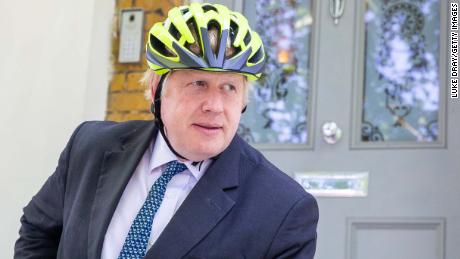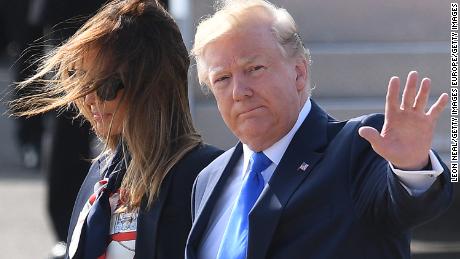London (CNN)To many an outsider, Britain seems to have been on drugs during its often farcical attempts to leave the European Union.
Now it seems to have been proven as the race to become the next Conservative prime minister sees an avalanche of mea culpas on past drug use.
The past two months have seen former Brexit Secretary Dominic Raab admitting to have dabbled with recreational cannabis, followed by Foreign Secretary Jeremy Hunt saying he quaffed a marijuana-laced drink while backpacking in India. Fellow Cabinet minister Rory Stewart joined the fray at the end of May, confessing to smoking opium at a wedding in Iran.
The most recent admission came this weekend when Michael Gove admitted to taking drugs on several occasions when he was a "young journalist" two decades ago. He called it a "mistake" that he "deeply" regrets.
In a released excerpt from a book on Gove's life, the Environment Secretary is said to have confessed, while being quizzed by his leadership team, to consuming cocaine.
"He was firmly instructed not to give that answer in public, and told instead to fall back on the words (former Prime Minister David) Cameron had used when he was running for leader, namely that politicians are entitled to a private life before entering politics," the Daily Mail reported off a passage from Owen Bennett's book "Michael Gove: A Man In A Hurry."
Asked directly by the BBC's Andrew Marr on Sunday if he had ever taken cocaine and if he knew it was a crime, Gove responded: "Yes it was a crime, it was a mistake, I deeply regret it."
Gove said he was "fortunate" he didn't go to prison. Asked if he had a cocaine "habit", Gove said: "No I don't believe it was."
The minister, who was previously Justice Secretary, said he has a "profound sense of regret about it all."
Drug of the privileged
The conventional wisdom in politics is any admission of drug-taking could finish off a person's career. But that trend has been bucked in the past few decades.
Before becoming US president, Bill Clinton in 1992 tried to squirrel out of marijuana questions by saying he didn't inhale in the 1960s. Former British Prime Minister Cameron remained coy on the rumor that he had smoked a joint while at school.
But cocaine is a harder drug than cannabis and has recently been blamed for a rise in violent crime in the United Kingdom. Last year, the commissioner of London's Metropolitan Police, Cressida Dick, called middle-class cocaine users hypocrites for "happily talking about global warming, fair trade, environmental protection and organic farming, but think there's no harm in taking a bit of cocaine," she said, according to The Times newspaper.
In the United Kingdom, addictive and expensive powder is usually considered the drug of choice among the privileged. Gove's alleged use of it "might reinforce the idea of the millionaire conservative," Tim Bale, professor of politics at Queen Mary University of London, told CNN.
Green Party MP Caroline Lucas admonished the "rank hypocrisy" of Gove, who is a former justice minister, "while backing policies that perpetuate harm. From locking up disproportionate number of young, black men, to treating drug misuse as crime rather than health issue, prohibition fails us all," she said on Twitter.
Past indiscretions
The leader of the opposition, Jeremy Corbyn, dismissed the news. "I think people should tell us what they have done and move on in life," the Labour Party leader told Britain's Press Association. "But I'm unconcerned about Michael Gove's past life or behavior, to be quite honest."
Raab, Gove's colleague, told BBC Radio 4's "Today" program he did not think the revelation would affect Gove's chances in the race. "I certainly don't see it barring him from this race in any way. I rather admire his honesty," he said.
And Bale, the politics professor, added: "I feel it is difficult to believe this will be a career-terminating event because there are so many other contenders who experimented when younger with soft or hard drugs."
The mixed response might be due to a move toward "more honesty and authenticity" in political campaigning, Bale said, adding that politicians are navigating an environment where the ease of sharing information online could be making it difficult for politicians to "bolt the door" on past indiscretions.
Even the top contender for the Conservative Party leadership, Boris Johnson, has previously admitted to trying cocaine and cannabis when he was a teenager. The 2007 revelation in GQ magazine is just one of the litany of Johnson's admitted indiscretions that has done little to shake his popularity among Conservative voters.
While it is hard to see the revelation killing off Gove's political career, it may scupper his chances among the 160,000 card-carrying members of the Conservative Party, who have the ultimate say on who will be the leader.
In a statement to the Daily Mail, Gove said the decision rests in the hands of "my colleagues in Parliament and members of the Conservative Party to decide now if I should be leader."
"I think all politicians have lives before politics," he added.
But with Conservative Party members being "older and more socially conservative than the average voter," Bale said, Gove might be out of luck.






